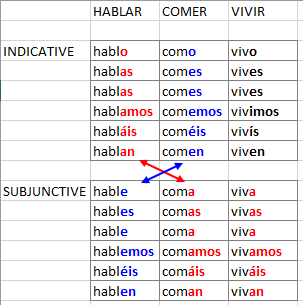I first asked this question in http://spanish.stackexchange.com/q/15929/11155
However the Spanish community has not found any answer yet and the phenomenon is observable in many Romance languages. I am wondering it anyone here in the Linguistics community will come with a plausible explanation.
As Comparative Grammar of the Romance Languages says:
To form the subjunctive, verbs normally switch their thematic vowel (a becomes e/i and e/i turns into a)
E.g. in Spanish the present subjunctive is formed by a kind of swapping the indicative endings between the verb declension classes: the 1st class (-a-) takes the indicative endings from the 2nd class (-e), and the 2nd and 3rd class (-i-) take the indicative endings from the 1st class:
QUESTION: Is it only coincidental, or is there something deeper behind it? Something like "as the subjunctive often expresses uncertainty, let's make the verbs sound weird by deliberately using a wrong set of endings to emphasize that we are not sure"?
Is there any theory about the origin of this particular switch? I am aware that this is inherited from Latin. The question is not about how the Romance languages inherited it. By origin I mean rather an idea behind.
And a bonus question: is anything like this (swapping thematic vowel between tenses/moods) in non-Romance languages?
